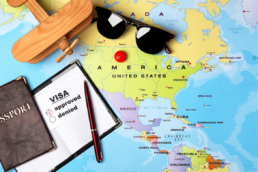
In an effort to reinforce national security, the House of Representatives has passed a bill that would place restrictions on visa-free travel to the United States. This legislation was passed three days after President Barack Obama’s Oval Office speech on terrorism, during which he “ordered the Departments of State and Homeland Security to review the Visa Waiver Program.”
The Visa Waiver Program (VWP) allows approximately 20 million visitors a year from 38 nations to enter the United States to stay for up to 90 days. Introduced in 1986, the program’s intent was to boost tourism and strengthen the U.S.’s ties with its allies. The VWP has been scrutinized by Congress following the Paris attacks on November 13, with concerns about travel and homeland security increasing. The attack in San Bernardino, California, on December 2 further heightened these concerns.
According to the new bill, VWP visitors will have to obtain a visa in order to travel to the United States if they had been to Syria, Iraq, Iran or Sudan during the past five years. Countries participating in the VWP must also share information with U.S. authorities about suspected terrorists. If they fail to do so, they will be faced with being suspended from the program.
U.S. Visa Waiver Program countries include the following: Andorra, Australia, Austria, Belgium, Brunei, Chile, Czech Republic, Denmark, Estonia, Finland, France, Germany, Greece, Hungary, Iceland, Ireland, Italy, Japan, Latvia, Liechtenstein, Lithuania, Luxembourg, Malta, Monaco, Netherlands, New Zealand, Norway, Portugal, South Korea, San Marino, Singapore, Slovakia, Slovenia, Spain, Sweden, Switzerland, Taiwan and the United Kingdom.
If the legislation is passed by the Senate and signed by President Obama, VWP participants traveling to the U.S. will also be required to have chip-enhanced passports containing biometric data. This would be expected to go into effect April 2016.
Ready to have Berardi on your side?
Whether you’re a business looking to hire or a professional hoping to relocate, immigration law can be complicated. But you don’t have to do it alone. Put our experience to work for you.


